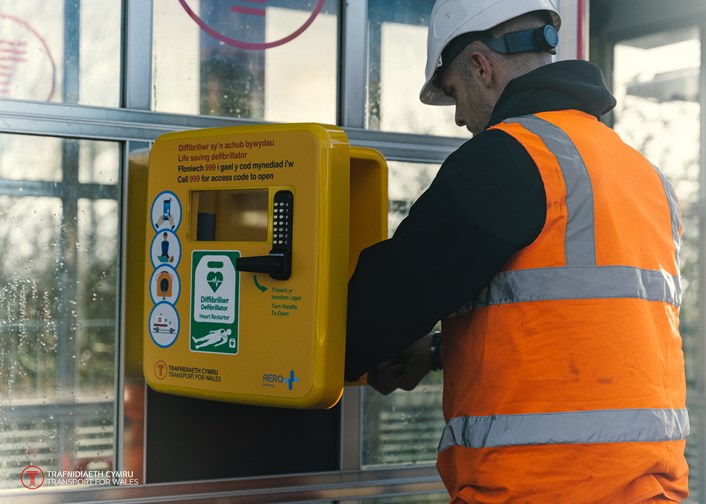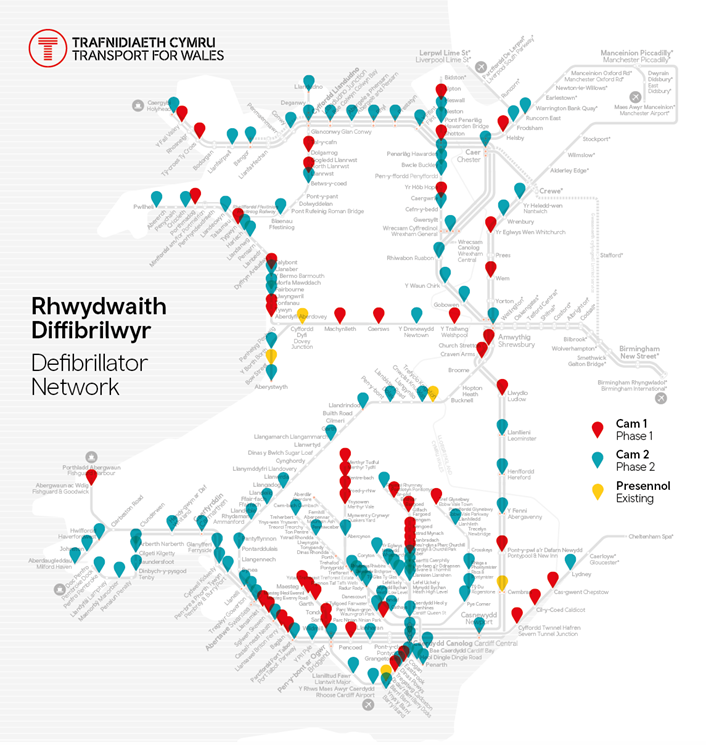02 Sep 2022
Transport for Wales (TfW) is continuing its rollout of life-saving defibrillators at stations across the Wales and Borders rail network.
The work is the latest phase of plans to install over 200 defibrillators at stations and in communities throughout Wales and the borders, which began in February 2022.
Defibrillators are important portable life-saving devices that can give a casualty’s heart an electric shock when it has stopped beating, normally in a sudden cardiac arrest. According to British Heart Foundation Cymru, there are around 2,800 out-of-hospital cardiac arrests in Wales each year, but just one in 20 people survive.
Survival rates fall by 10% every minute without CPR or by using a defibrillator and using a defibrillator within three minutes of a cardiac arrest can improve a person's chance of survival by as much as 70%.
Once ready for use the defibrillators will be registered on the British Heart Foundation’s bespoke portal, called The Circuit, in partnership with St John Ambulance, the Resuscitation Council UK and the Association of Ambulance Chief Executives. The Circuit maps out defibrillators for NHS ambulance services across the UK so in the crucial moments after a cardiac arrest, they can swiftly direct members of the public to the nearest defibrillator.
Lisa Cleminson, Transport for Wales’ Stations Director, said:
“We’re proud to be rolling out defibrillators across the Wales and Borders network. These yellow boxes are vitally important in helping those who experience a cardiac arrest, be they TfW customers, colleagues or someone in the local community.
“We already have defibrillators in many of our stations across our network, and these additional new machines will become a valuable life-saving resource.”
“We’re encouraging customers and community to support us in keeping this equipment safe and secure by being vigilant and reporting any incidences of vandalism immediately to British Transport Police by texting 61016.”
The project has been organised by TfW’s Rail Infrastructure Director Karl Gilmore, who added: “All of the defibrillators will be available 24 hours a day but, more crucially, they will all be listed on The Circuit so emergency services staff know where they are located.
“Our staff will be given training on how to use the defibrillators and we’re working with charities and other organisations to make sure we can roll out training into communities.”
Antony Kelly, Construction Director at Egis, said:
"It’s not often you get to work on a project that you know has a direct and tangible effect on people’s lives, and certainly not one that can directly save lives. I’m extremely proud to lead our construction department at Egis Transport Solutions working on behalf of Transport for Wales’ Station Improvement team on the installation of lifesaving defibrillator equipment on stations throughout the Wales network.
“Having personally felt the impact of an immediate family member who died from cardiac arrest, it’s even more disappointing to hear that the defibrillators that TfW are investing in, are being mindlessly vandalised. These units are here to save lives, it could be yours or a family member who needs one, and you won’t know when you need it. If we see this out on the network, whether on duty or not, I urge everyone to report and help protect these assets. It is a criminal offence.
“Egis are committed to making sure this message gets to those who need to hear it, and with the support of our colleagues in TfW, we are looking to develop some outreach programmes to assist in getting the message out into the community"
Nick Culshaw, Managing Director, UK Civils and Rail for Sisk said:
“Sisk Rail is delighted to be carrying out these works throughout Wales and the border rail network on behalf of TfW.
“These 200 defibrillators will provide vital life-saving equipment in local communities. We hope that in the event of a sudden cardiac arrest that the installation of these defibrillators will help to save lives.”
Notes to editors
Phase 2 Stations:
Abergavenny
Abergele and Pensarn
Abercynon
Aberystwyth
Ammanford
Bangor
Barmouth
Barry Island
Betws-y-Coed
Birchgrove
Blaenau Ffestiniog
Borth
Bridgend
Buckley
Caerphilly
Cardiff Bay
Cardiff Central (x4)
Cardiff Queen Street (x3)
Carmarthen
Cathays
Cefn-y-Bedd
Chester (x2)
Chirk
Cogan
Colwyn Bay
Conwy
Coryton
Criccieth
Dinas Powys
Dingle Road
Dolau
Fairbourne
Ferryside
Ffairfach
Flint
Frodsham
Gobowen
Gowerton
Harlech
Haverfordwest
Hawarden
Heath High Level
Hereford (x2)
Holyhead
Johnston
Kidwelly
Kilgetty
Knucklas
Leominster
Lisvane and Thornhill
Llandaf
Llandanwg
Llandecwyn
Llandovery
Llandrindod
Llandudno
Llandudno Junction
Llanelli
Llanfairpwll
Llangadog
Llangammarch
Llanharan
Llanhilleth
Llanishen
Llantwit Major
Llwyngwril
Lydney
Manorbier
Milford Haven
Nantwich
Narberth
Neath
Neston
Newport (x2)
Newtown (Powys)
Pembrey & Burry Port
Pembroke
Penarth
Penyffordd
Pontarddulais
Port Talbot Parkway
Prestatyn
Pwllheli
Pye Corner
Pyle
Radyr
Rhiwbina
Rhoose Cardiff International Airport
Rhyl
Rhymney
Risca & Pontymister
Rogerstone
Ruabon
Runcorn East
Shrewsbury
Swansea
Taffs Well
Tenby
Treforest
Treforest Estate
Treherbert
Ty Glas
Waun-Gron Park
Whitland
Wrenbury
Wrexham Central
Wrexham General
Ystrad Rhondda



